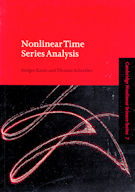The framework of deterministic chaos constitutes a new approach to the analysis of irregular time series. Traditionally, nonperiodic signals have been modelled by linear stochastic processes. But even very simple chaotic dynamical systems can exhibit strongly irregular time evolution without random inputs. Chaos theory offers completely new concepts and algorithms for time series analysis which can lead to a thorough understanding of the signals. The book introduces a broad choice of such concepts and methods, including phase space embeddings, nonlinear prediction and noise reduction, Lyapunov exponents, dimensions and entropies, as well as statistical tests for nonlinearity. Related topics such as chaos control, wavelet analysis and pattern dynamics are also discussed. Applications range from high-quality, strictly deterministic laboratory data to short, noisy sequences which typically occur in medicine, biology, geophysics, and the social sciences. All the material is discussed and illustrated using real experimental data.
This book will be of value to any graduate student or researcher who needs to be able to analyse time series data, especially in the fields of physics, chemistry, biology, geophysics, medicine, economics, and the social sciences.

